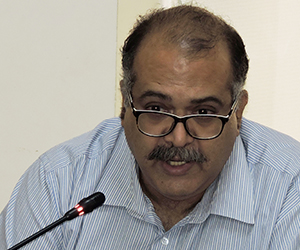The policy shift being attempted by Afghanistan President Ashraf Ghani in which he sought to relegate India to the fourth circle of priority and appease Pakistan has had mixed reception in the Indian strategic community. It ranges from disappointment over side-lining of India to a resigned acceptance of an emerging situation in which India's space may get constricted. The result is both a sort of detachment over what happens in Afghanistan and hope of seeing China and Pakistan getting steadily bogged down in the Afghan quagmire.
At the policy level, uncertainty about how to handle the emerging situation in Afghanistan is visible. Some reports suggest that India has started to reduce its footprint in Afghanistan and slow down some of its projects. While it is entirely possible that India might be entering a phase of 'strategic pause', it can neither detach itself from Afghanistan nor be despondent over developments there. Between an aggressive 'forward policy' which India probably can't sustain on its own, and 'masterly inactivity' which it cannot afford because of its security and strategic implications, there is enough space available to India to keep itself relevant and in play in Afghanistan.
Given the fluid state of affairs in Afghanistan, a case can be made for a strategic review of India's Afghan policy. This must include a realistic assessment of what India can and cannot do and what it should and should not do. In other words, India must neither over-reach itself nor underplay itself. Even as India must remain conscious of its limitations-- economic, geographic and logistical--it should not lose sight of the advantages it enjoys that mitigate many of these limitations. Apart from clearly defining India's strategic objectives in Afghanistan and how these can be achieved, India also needs to work out contingencies and fallback positions in the event these objectives become unattainable.
In survey after survey, India has emerged as the most liked country in Afghanistan. The tremendous goodwill that India enjoys there is its biggest asset. Unlike countries like Pakistan that have only contributed to destruction of Afghanistan, or countries like the USA that has been involved in both rebuilding Afghanistan and using heavy handed methods to pacify the country, India has exercised only soft power. It is, therefore, seen as a benign and benevolent neighbour. But soft power has its limitations, especially in a country like Afghanistan that has had to contend with unremitting hostility from an implacable enemy--Islamist insurgents--supported by an inimical neighbour. What this means is that while India can help in stabilising Afghanistan, it has not been able to prevent Afghanistan's destabilisation.
Providing economic assistance, funding developmental projects, helping through military and administrative capacity building and security assistance in the form of intelligence cooperation and even providing some modest equipment to the Afghan security forces, was all necessary in the effort to help Afghanistan stabilise. But it wasn't sufficient because India's reluctance to exercise hard power was seen as a sign of weakness, not just by the Pakistanis, but to some extent even by the Afghans who saw India conceding to Pakistani concerns and sensitivities even when Pakistan had used all opportunities to damage India’s interests. If, therefore, the pre-eminent regional power was hesitant to play hard ball with Pakistan, then surely the Afghans needed to rethink their view of India as a solid counterbalance to the Pakistanis. This is precisely the kind of negative perception of India that needs to be removed, not just in Afghanistan, but also in the region and beyond. Such perception seriously reduces India's strategic space.
In Afghanistan, the overbearing nature of the Pakistani military establishment as well as its proclivity to overplay its hand works in favour of India. Regardless of which regime comes into power in Kabul, sooner or later it will seek to have a counterbalance to Pakistan, unless either the Afghans reconcile to living under Pakistani domination or else Pakistan changes its strategic thinking. Neither of this is likely to happen. For India therefore to ignore this natural advantage it has in the Afghanistan-Pakistan equation as a balancing factor would be a folly.
Much of India's strategic diffidence comes from its tendency to over-emphasise its limitations and underestimate its advantages. Partly to offset some of these limitations, India preferred to ride on American shoulders in Afghanistan. Although India thus benefitted from US presence in Afghanistan, it also paid the price of having to accept US pressure to limit its activity in Afghanistan to development areas so that the US could manage Pakistani paranoia about a strong Indian presence in Afghanistan. As long as the Americans were present in Afghanistan India could not altogether disregard some US demands and re-jig its policy accordingly.
But this is no longer a compulsion, now that the Americans are in the process of withdrawing from Afghanistan. In the last couple of years there is a growing dis-connect between India and the US on the emerging situation in the AF-PAK region. Both want stability in the region but differ on how this can be achieved. The Americans seem to be tilting towards Pakistan as a stabilising factor, while India is convinced that Pakistan being the problem it cannot be part of the solution. The Indian government should therefore safe guard the country’s interests without being too concerned about US reaction. We need not take the lead from the Americans and pay too much attention to Pakistani views, especially as Pakistan has always totally disregarded Indian sensitivities and concerns. India, unlike the US, cannot wash its hands off this region. To the contrary, India will have to bear the consequences of American mistakes.
India's fundamental interest Afghanistan is not economic, whether in terms of benefiting from its market or mineral wealth (whose exploitation is beset with difficulties) or from its geographical location as the main trade and transit route to Central Asia (whose economic potential remains a question mark). Nor is it centred on encircling Pakistan. These are incidental to Indian interests. For India, a stable and peaceful Afghanistan is critical because instability and conflict in that country has a deleterious impact on India’s security. A Taliban type dispensation in Afghanistan will have a massive destabilising effect on rest of the region, and as such is not acceptable.
For India to protect its interests in Afghanistan, it can neither detach itself from the situation there nor become discouraged by any temporary setback. In Afghanistan there is never an endgame, and what is often called an endgame is usually the beginning of a new Great Game. This means India needs to not just maintain but expand its presence in Afghanistan as much as possible. At the very least, India's economic and developmental footprint must increase in Afghanistan, because unless there is more economic activity inside that country, ensuring security will remain a huge challenge. Therefore, India should do whatever it can to give a fillip to the Afghan economy. In this context, India should stop talking about its much quoted $ 2 billion assistance to Afghanistan, because as a two trillion dollar economy, India has the capacity to do more.
Pakistan will of course be the big stumbling block in terms of India’s enhanced involvement in the Afghan economy. By restricting Afghanistan's connectivity to its natural market in India, Pakistan is behaving true to form. Instead of harming India, it is harming Afghanistan as it is preventing it from becoming economically self-sustaining. Of course, where it suits Pakistan's interests- as in the case of the TAPI gas pipeline project- Pakistan’s reasons to block Afghan access to India and vice versa are set aside. Pakistan also believes that by restricting transit through its territory it will also deny India access to Central Asia. But as India can access Central Asia through Iran, Pakistan is effectively is cutting its own nose (it has the most to gain by becoming a bridge between Central Asia/ Afghanistan and India) to spite India's face. Despite all the impediments placed by Pakistan, India should still do what it can to meet Afghan’s expectations, not just in the realm of economics but also in terms of capacity building through training of civil and military personnel, and funding and building economic infrastructure. India should also continue to encourage and promote people-to-people ties between India and Afghanistan, especially in the fields of medicine and education.
At a time when the Modi government has a declared policy of reaching out to India's neighbours and tying them more closely to India's development process, to disengage ourselves from Afghanistan because of certain statements and actions of the new dispensation there, is against the strategic vision that India has developed for the region. No matter what the Afghans say in public- which is music to Pakistani ears- the fact remains that the Afghans don't trust or even like the Pakistanis, who, on their part, treat the Afghans with an element of disdain and misplaced superiority. Any tactical adjustment that the Afghans make with Pakistan should not cause an exaggerated reaction in India. We should display strategic patience and stay the course in Afghanistan. Lowering our presence in Afghanistan because of certain policy adjustments being made by the new Afghan government is not the way a regional power should behave. Not only will this mean leaving India's considerable number of friends in Afghanistan in the lurch, it would have serious negative implications for India's regional strategy because other regional countries will question India’s staying power in the face of a challenge to its interests.
This is precisely the advice that India's long-standing friends in Afghanistan give us. They ask India not to react to every small statement or policy shift by Afghanistan, stay the course and play the long game because given the convergence of interests of India and the Afghan people things will ultimately move in India's direction. Their message is that India is indispensable for Afghans and that India needs to understand this. Therefore, for India to detach itself from Afghanistan or reduce its footprint considerably – a form of masterly inactivity--would be leaving the field open to its and Afghanistan's adversaries. And while India cannot play the role that the Americans played in terms of propping up Afghanistan, there is much that India can do to support the Afghan state, which it should continue to do in the interest of the Afghans and of India itself.
Published Date: 24th April 2015, Image Source: http://www.thelondoneveningpost.com











Post new comment